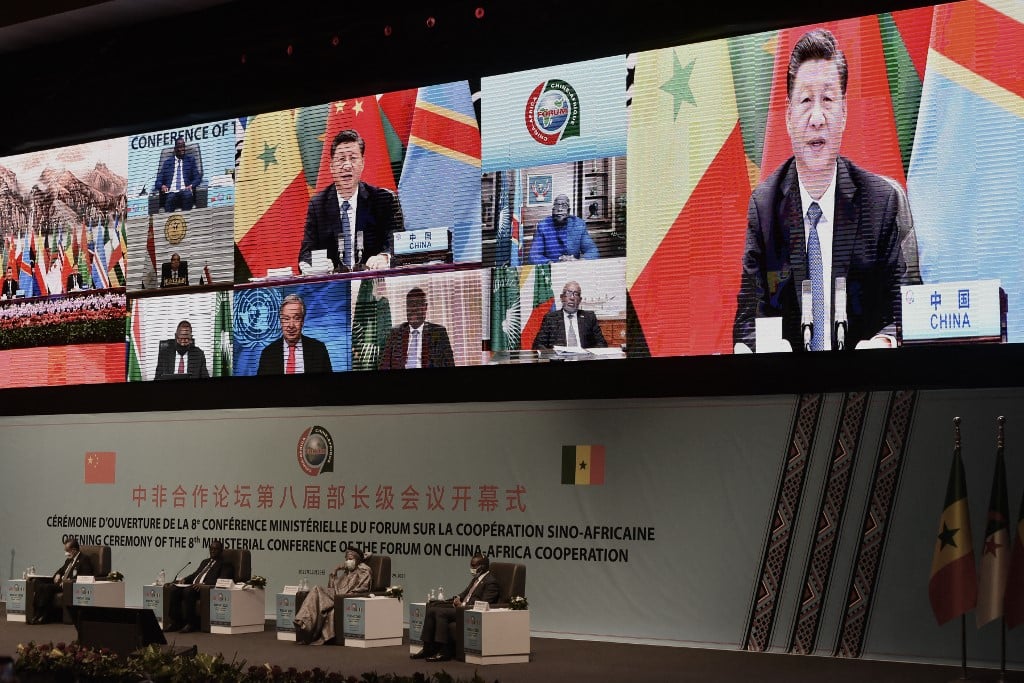China will provide another 1bn doses of Covid-19 vaccine to Africa, announced President Xi Jinping of China in a live video address to the opening ceremony of the Forum on China-African Cooperation (FOCAC) in Dakar on 29 November.
Other key announcements by the president included a pledge to boost Chinese imports of African products, Chinese participation in African poverty reduction programmes, a green development programme, a capacity building programme and a digital innovation programme, which we examine in detail below.
What does FOCAC 2021 tell us about China-Africa relations?
The eighth edition of FOCAC took place in Dakar, Senegal, from 29-30 November 2021 under the theme “Deepen China-Africa Partnership and Promote Sustainable Development to Build a China-Africa Community with a Shared Future in the New Era”.
“Twenty years ago,” said President Macky Sall of Senegal in his welcoming address to delegates, “China and Africa, determined to reinforce and take their historic relations to a higher level, established FOCAC as a new framework for formal and mutually beneficial partnership.”
“Since then, we have moved forward hand in hand, pragmatically and effectively, as evidenced by the intensification of our trade, investments and the many achievements under our various action plans.”
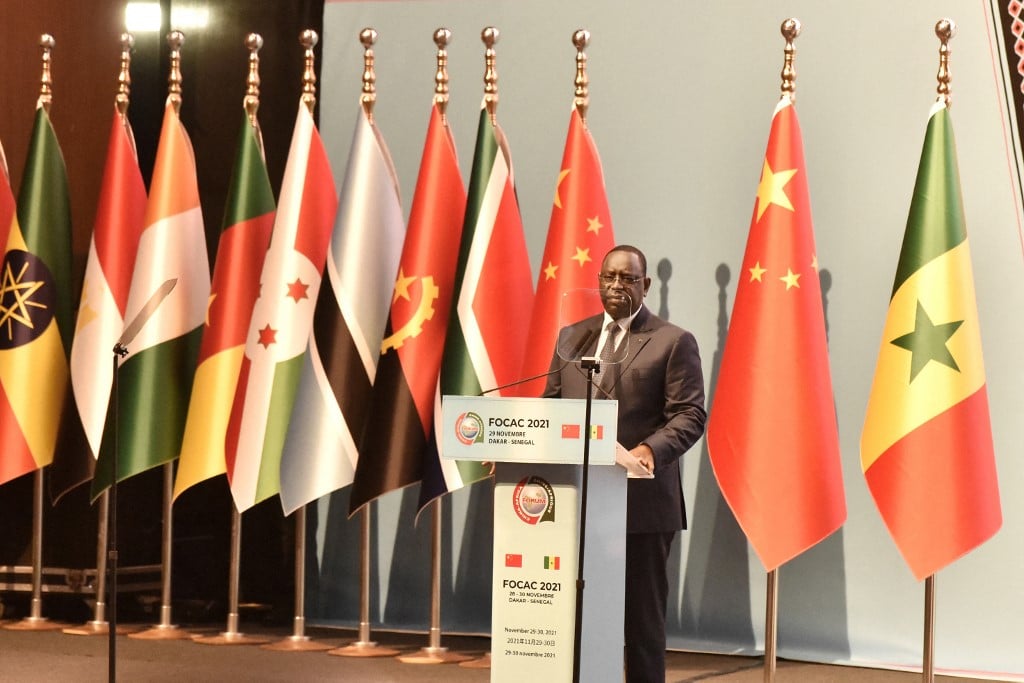
The forum adopted four key resolutions: The Dakar Action Plan (2022-2024); the China-Africa Cooperation Vision 2035; the Sino-African Declaration on Climate Change; and the Declaration of the Eighth Ministerial Conference of FOCAC.
Presenting the four key resolutions to the public at the beginning of November, Senegal’s foreign minister, Aïssata Tall Sall, declared: “FOCAC is our common good. Its success will bring prosperity to current and future generations of Africans and Chinese.”
Unlike the 2018 edition in Beijing, the event took place at ministerial level rather than summit level, but according to commentators this does not indicate any diminishing of relations between China and Africa – we examine the evolution of the forum since its inception below.
President Xi’s speech contained a number of financial commitments. The Financial Times reported that “amid growing debt concerns” Beijing had lowered its commitment to Africa from $60bn in 2018 to $40bn but that President Xi had “emphasised his commitment to what he called a “win-win” relationship”.
The newspaper quoted Chidi Odinkalu, senior manager for Africa at the Open Society Foundations, as saying that the reduced financial pledge showed that Beijing no longer had to try so hard in Africa and that some African governments relied too heavily on loans from China.
“The volume of credit that some of them have binged on makes them dependent beyond any sensible notion of sovereignty,” he said.
However, in a press conference in Nairobi on 4 December, China’s ambassador to Kenya, Zhou Pingjian, countered arguments that Beijing had cut its financing to Africa.
Referring to the commitments outlined by President Xi in a nine point programme announced at the forum (see below), he said:
“This is roughly in excess of $40bn. And that is before you factor in the pledge to supply 1bn vaccines which takes a lot of money. Particularly, the donations will take another $10bn plus.”
He said that not all of China’s commitments had been ascribed a monetary value but that “financial support from China to Africa will only increase. It will never reduce.”
He also stressed that the commitments had been made after lengthy discussions between China and Africa’s representatives and that.
“In the new arrangement,” he said, “the basic principle of China is to meet Africa’s most pressing needs. We settle on all these programmes after enormous consultations. We listen a lot to our partners in Africa.”
Hannah Ryder, CEO of China-based development NGO Development Reimagined, pointed out that China’s commitment to 10 development projects could raise the sum to over $60m.
In a recent article for African Business, Ryder also argues against the notion that China isrealising how “risky” is to provide finance to African and other developing countries.
“Debt distress analysis – by design – can exaggerate perceptions of African risk,” she says. “Fortunately for African countries in need of both concessional and commercial loans, Chinese stakeholders do not primarily use these ratings to determine their financial decisions. As I have said before in these columns, it is crucial to focus on the quality of what African governments use loans for.
“If loans are used for infrastructure that enables citizens to raise their productivity and create new business markets or models – infrastructure such as rail, industrial energy or internet cables – rather than recurrent expenditure, and interest rates are kept low, China and others can expect to get their loans back.”
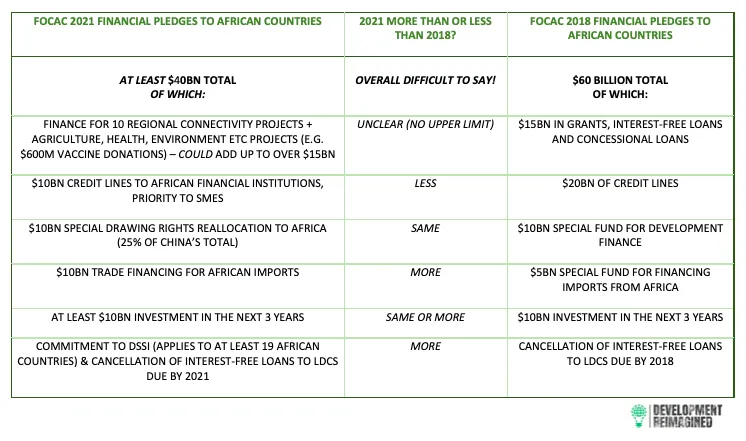
Nine programmes to strengthen China-Africa cooperation
In his speech, President Xi said that in the run-up to FOCAC, the Chinese and African sides had jointly prepared the China-Africa Cooperation Vision 2035. Under its first three-year plan, he said, China will work closely with African countries to implement nine programmes. Highlights of the programmes include:
1. The medical and health programme: Delivery of 1bn doses of Covid-19 vaccine
To help Africa reach its target of vaccinating 60% of the African population by 2022, China will deliver a further 1bn doses of Covid-19 vaccine to Africa. This will come in the form of 600m doses as donation and 400m doses to be provided through joint production by Chinese companies and African countries.
“A billion doses of vaccine is a big pledge,” Carlos Oya, an expert on China-Africa relations at Soas, University of London, told the Financial Times. “If they pull that off that would make the rest of the world look awful.”
In addition, China will undertake 10 medical and health projects for African countries, and send 1,500 medical personnel and public health experts to Africa.
2. The poverty reduction and agricultural development programme
Measures will include China undertaking 10 poverty reduction and agricultural projects for Africa, and sending 500 agricultural experts to the continent.
3. The trade promotion programme
China will aim to reach $300bn in total imports from Africa in the next three years. Measures will include opening “green lanes” (prioritisation of the inspection of foodstuffs and agricultural goods) for African agricultural exports to China and further increasing the scope of products enjoying zero-tariff treatment for the least developed countries that have diplomatic relations with China (which means all African countries apart from Eswatini).
China will provide $10bn of trade financing to support African exports.
China will undertake 10 connectivity projects for Africa, form an expert group on economic cooperation with the secretariat of the African Continental Free Trade Area (AfCFTA), and give continued support to the development of the AfCFTA.
4. The investment promotion programme – allocation of SDRs
China will encourage its businesses to invest at least $10bn in Africa in the next three years, and will establish a platform for China-Africa private investment promotion.
China will undertake 10 industrialisation and employment promotion projects for Africa, provide credit facilities of $10bn to African financial institutions, support the development of African SMEs on a priority basis, and establish a China-Africa cross-border RMB centre.
China will exempt African LDCs from debt incurred in the form of interest-free Chinese government loans due by the end of 2021.
President Xi also indicated that China is ready to channel to African countries $10bn from its share of the IMF’s new allocation of Special Drawing Rights (SDRs).
SDRs, often referred to as “paper gold”, provide central banks access to dollars through the IMF, giving them foreign exchange liquidity. The IMF created $650bn of SDRs in August to help stimulate recovery from the Covid-19 pandemic.
The SDRs were allocated to countries in proportion to the size of their economies, which meant very few went to Africa. However, a summit on refinancing African economies held in Paris in May had called on richer countries to reallocate $100bn of their SDRs to African countries.
“The 33bn special drawing rights allocated to Africa are insufficient given the immensity of Africa’s needs for its economic recovery,” said Félix Tshisekedi addressing the UN General Assembly in his capacity as chair of the African Union in September.
“This is why the UN and its member states must support the objective of the Paris Summit of reaching 100bn SDR for Africa.”
$10bn represents 25% of China’s SDR allocation, a bigger proportion than the 20% pledged by France, Italy and the UK, or the 18.6% pledged by the US.
“China has ‘trumped’ western countries by pledging to redirect a quarter of its IMF pandemic recovery boost to African countries – more than any other nation,” comments Chloé Farand writing on Climate Home News.
5. The digital innovation programme
China will undertake 10 digital economy projects for Africa, set up centres for China-Africa cooperation on satellite remote-sensing, and support the development of joint laboratories, partner institutes, and scientific and technological innovation cooperation bases.
Online shopping festivals promoting African products and a campaign to market 100 African stores and 1,000 African products on e-commerce platforms are promised.
6. The green development programme
China will undertake 10 green development, environmental protection and climate action projects for Africa, support the development of the “Great Green Wall”, and build centres of excellence on low-carbon development and climate change adaptation in Africa.
7. The capacity building programme
Projects will include the building or upgrading of 10 schools in Africa, invite 10,000 high-level Africans to training programmes and promote vocational training.
8. The cultural and people-to-people exchange programme
Chinese tourism in African countries will be promoted and facilitated.
9. The peace and security programme
President Xi said that China will undertake 10 peace and security projects for Africa. It will continue to deliver military assistance to the AU, support African countries’ efforts to independently maintain regional security and fight terrorism, and conduct joint peace-keeping exercises.
Ramaphosa praises progress but calls for reduction of trade deficit
“Since its inception, FOCAC has been an engine for progress,” said President Ramapahosa in his address to the opening ceremony by video link.
He praised FOCAC as a “beacon of hope” and a “valuable platform for dialogue… and for amplifying Africa’s voice on the world stage.” He also drew attention to the gains it had brought in terms of trade and investment and the cooperation it had fostered in fields from higher education to medical care and transportation.
But he also emphasised the need to reduce the trade deficit between China and Africa.
“Over the next three years we will be implementing the Dakar Action Plan,” he said. “This will require that we recalibrate the Sino-Africa relationship with a greater emphasis on promoting sustainable development for the benefit of all.
He also called on China “to increase infrastructure investment in Africa, especially in key sectors such as port, rail, energy and water, and to continue to support human capital development and technology transfer.”
- FOCAC 2021: China and Africa need each other more than ever
- Can China-Africa shift to become Africa-China?
- As FOCAC turns 20 what can Africa learn from China?
- China-Africa relations enter new era as easy money dries up
What is FOCAC?
FOCAC is a triennial high-level forum between China and all of the states of Africa, with the exception of Eswatini, which continues to recognise Taiwan.
Modelled on Japan’s Tokyo International Conference on African Development (TICAD), it provides an organising mechanism for Chinese foreign policy toward Africa.
The US Department of Defence’s Africa Center for Strategic Studies describes FOCAC as “a process rather than a series of summits”, as it has spawned a vast number of consultation meetings, policy forums and specialist organs, as described in detail on the FOCAC website.
The Africa Center for Strategic Studies also draws attention to its focus on training and capacity building, with more than 100,000 training slots allotted to African Union member states triennially.
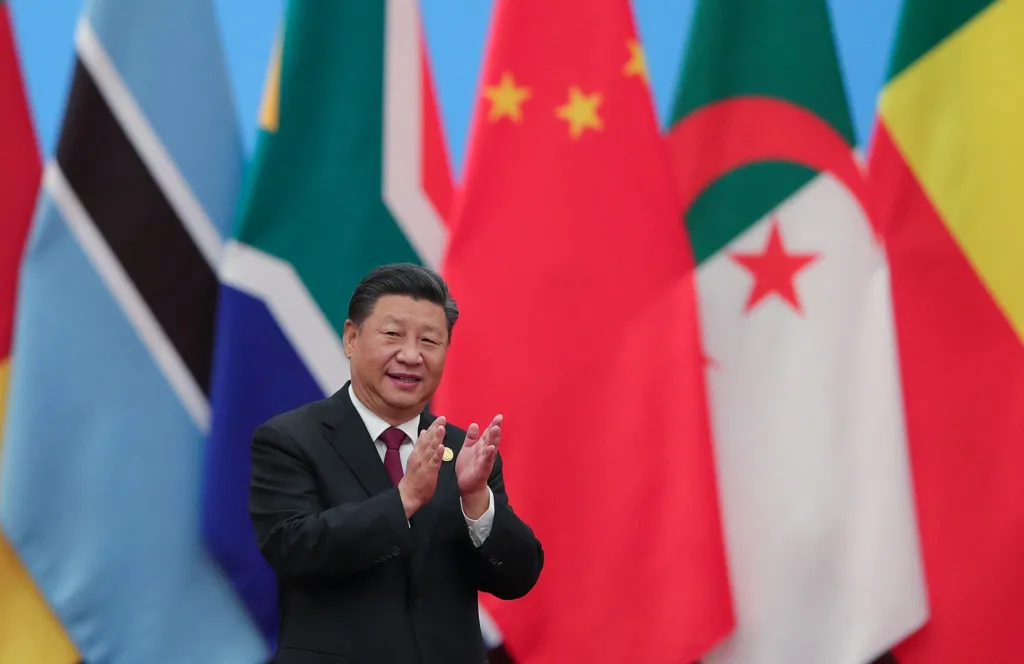
FOCAC has frequently played host to eye-catching Chinese policy announcements and financial commitments. The forum is alternately hosted in Beijing and major African capitals.
Three of the eight editions held so far have included summits attended by the incumbent Chinese president and many of his counterparts across the continent. According to Quartz Africa, twice as many African leaders chose to attend the 2018 summit in Beijing than the UN General Assembly two weeks later.
The 2021 forum took place at ministerial rather than summit level. China was represented by its foreign minister, Wang Yi, rather than President Xi Jinping. However, as Lauren A. Johnston of Adelaide University has pointed out, this does not indicate a downgrading of FOCAC: “Although Mr. Xi will only speak to the Forum from China’s capital Beijing via video-link, China-Africa ties are compounding apace.”
The 2021 forum looked to build on the increasingly close economic relations that have been forged between China and Africa over the last 20 years.
According to the China-Africa Research Institute at Johns Hopkins University, the value of China-Africa trade in 2019 was $192bn, up from $185bn in 2018. In 2019, the largest exporter to China from Africa was Angola, followed by South Africa and the Republic of Congo. In 2019, Nigeria was the largest buyer of Chinese goods, followed by South Africa and Egypt.
On 17 November, Chinese vice commerce minister Qian Keming reported that trade between China and Africa had risen 38.2% year on year to $185.2bn in the January-September 2021 period, a record level.
China is also Africa’s biggest source of foreign direct investment – investment surged from $75m in 2003 to $2.7bn in 2019. Chinese FDI flows to Africa have exceeded those from the US since 2014.
China’s direct investment in Africa hit $2.59bn in the first nine months of 2021, up 9.9% year on year, reported Qian Keming.
Between 2013 and 2018, 45% of China’s foreign aid went to Africa. The number of Chinese workers in Africa by the end of 2019 was 182,745, according to official Chinese sources.
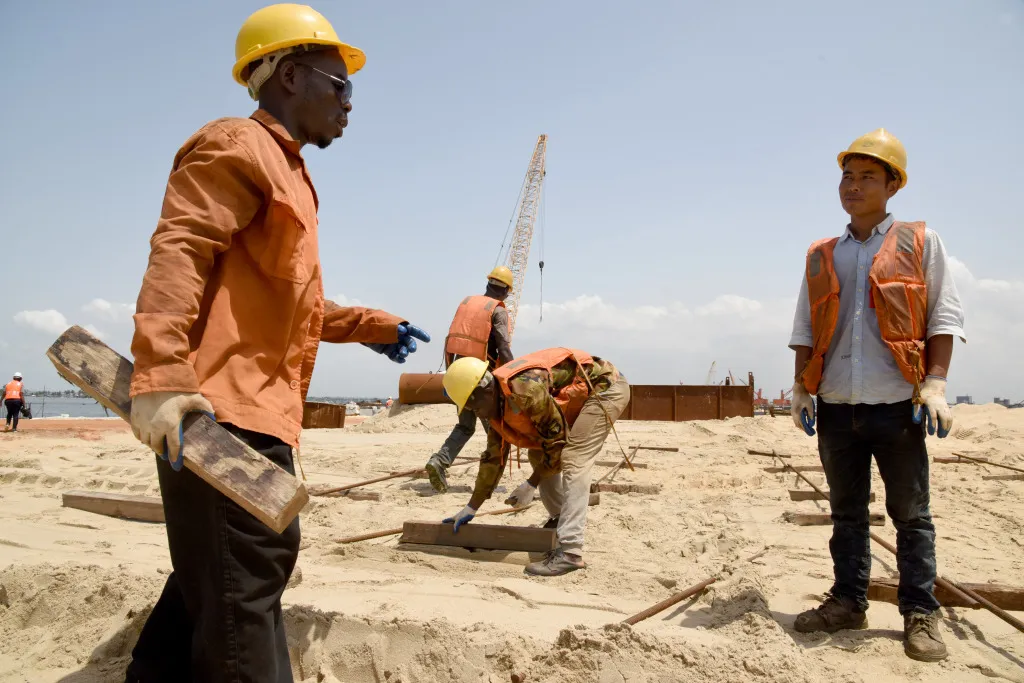
How has FOCAC impacted the financial relationship between China and Africa?
The first official FOCAC was held in Beijing in 2006, following two major ministerial conferences in Beijing and Addis Ababa in 2000 and 2003.
Between 2000 and 2019, Chinese financiers signed 1,141 loan commitments worth $153bn with African governments and their state-owned enterprises, estimates the China-Africa Research Institute at Johns Hopkins University.
In 2000, Chinese investment in Africa was at 2% of US levels, while by 2020 it had reached 55%, according to the US Department of Defense’s Africa Center for Strategic Studies.
In 2015, China unveiled its largest commitment of the conference series, a $60bn package of aid, subsidised lending, and state-backed investment, a commitment repeated in 2018.
Chinese financial support has proved crucial to African countries over the last two decades. Loans from government and state-owned banks have enabled the construction of major infrastructure projects across the continent, including highways, ports, airports and government buildings.
But much of that support has been relatively opaque. According to a research paper released in late September by the China Africa Research Institute, Zambia’s outstanding external debt to Chinese financiers is approximately $6.6bn, almost double the $3.4bn revealed by the previous Zambian government.
The estimates do not include substantial arrears to Chinese contractors for unpaid projects, part of an estimated domestic arrears pile amounting to $2bn.
Future trajectories of China-Africa relations
The report FOCAC at 21: Future Trajectories of China-Africa Relations published in October by the China Foresight project at the London School of Economics brings together a number of international experts to examine emerging trends likely to shape China-Africa relations in coming years.
- Stephen Paduano, executive director of the LSE Economic Diplomacy Commission, says that the crux of China’s foreign economic policy since the death of Mao has been running trade surpluses. It is far from certain that China can pull back from its overseas spending spree, as a decline in overseas capital flows would create a decline in China’s trade surplus that could be politically unpalatable.
- Mzukisi Qobo, head of Wits School of Governance at the University of the Witwatersrand in South Africa, highlights three crucial areas in China-Africa relations:
(1) cooperation on trade, using the African Continental Free Trade Area as a basis for broadening agreement;
(2) digital technology, where China is likely to “aim to draw Africa to its digital orbit on the back of technology cooperation and possibly development assistance that is tied to the use of Chinese technology”;
(3) supporting Africa’s economic recovery through ramped up development assistance and sectoral cooperation, encompassing both agriculture and industrial sectors.
The report also contains articles by experts examining China’s security engagement with Africa, its digital infrastructure in Africa, educational exchanges, collaboration on space technology and China-Africa health cooperation and vaccine diplomacy.
Additional research and reporting by Charles Dietz.
Want to continue reading? Subscribe today.
You've read all your free articles for this month! Subscribe now to enjoy full access to our content.
Digital Monthly
£8.00 / month
Receive full unlimited access to our articles, opinions, podcasts and more.
Digital Yearly
£70.00 / year
Our best value offer - save £26 and gain access to all of our digital content for an entire year!
 Sign in with Google
Sign in with Google 